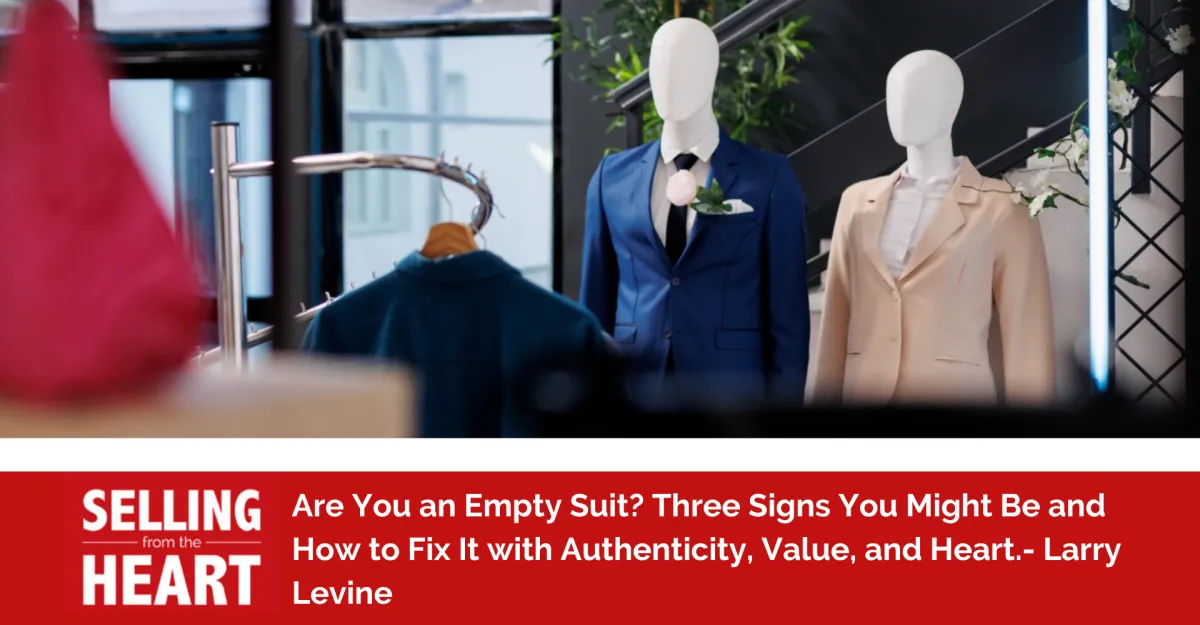The Selling From the Heart Blog

Are You an Empty Suit? Three Signs You Might Be and How to Fix It with Authenticity, Value, and Heart.
"Empty pockets never held anyone back. Only empty heads and empty hearts can do that."
Norman Vincent Peale
This quote sure does remind me that a lack of money or material resources is not what truly limits a person’s potential. Instead, could it be a lack of ideas (empty heads) or a lack of passion and determination (empty hearts) that can hold someone back from achieving their dreams?
What do you think?
This is a powerful reminder that the most significant limitations many of us face are often internal, residing not in our bank accounts or possessions, but within our minds and spirits.
If we applied this to salespeople, it may look like this:
Empty Heads (Lack of Ideas) - Could this be caused by a lack of creativity, curiosity, and intellectual engagement with clients and future clients? Without new ideas, innovative solutions, or a desire to learn and explore, many in sales fall short of their potential, remain stagnant, regardless of their material circumstances.
A person's wealth can be squandered, but a fertile mind can generate endless possibilities.
Empty Hearts (Lack of Passion and Determination) - Could this be caused by the absence of intrinsic motivation, drive, and resilience? Even with brilliant ideas, without the passion to fuel action and the determination to overcome obstacles, dreams will likely remain unfulfilled.
Material resources can provide comfort, but they cannot ignite the inner fire necessary for sustained effort and achievement.
Looking inward is your greatest resource. The power to achieve your dreams both personally and professionally ultimately resides within yourself. The question becomes... What will you do about it?
Why is this so important?
In today’s noisy, cynical business world, where every buyer has been burned and trust feels like a rare currency, the worst label a salesperson can wear, being referred to as an empty suit.
It’s a stinging phrase, isn’t it?
An empty suit might look sharp and polished on the outside but underneath? There’s nothing real. No substance. No sincerity. No disciplined and consistent follow-through.
People are no longer fooled by surface-level polish. They’ve grown weary of smooth talkers who show up full of flair but empty of authenticity. These so-called professionals may show up on time, recite a script, and check the boxes, but they fail to create human connection.
Why? Because there's nothing real anchoring their presence.
These performers lack:
Authentic Relationships – They haven’t invested the time to get to know their clients, their world, or their challenges.
Meaningful Value – They talk about features, not outcomes. They sell products, not possibilities.
Inspirational Experience – Their interactions are transactional, not transformational. This leaves people feeling sold, not served.
Disciplined Habits – There’s no consistency, no follow-up, no commitment to the long game.
While people may not say it to their face, many are thinking it the moment their words echo hollow, their actions feel performative, or their follow-up is lackluster at best.
So, how do you know if you're being perceived this way?
And more importantly, how do you correct it?
During our time together, we will dive into three major signs you may be viewed as an empty suit and what you can do about it, starting right now.
Are you ready? Say at loud, "I am ready!"
Sign #1 - You Show Up Polished, But You’re Not Present
In sales, the heart always comes before the head.
The Warning Sign
You’ve got the look. You know, the polished LinkedIn profile. The polished pitch. You ask how someone’s weekend went but your eyes are already darting to your next talking point.
You send a slick marketing generated proposal, but it’s templated and impersonal. You’re there in the meeting but not really there. People feel it. They sense it. They know it.
This is surface-level engagement and it's the breeding ground of the empty suit label.
Why It Happens
Often, it's not because you don't care. It's because you're focused on the doing instead of the being. You're checking boxes, hitting KPIs, and delivering your lines. Presence isn’t about performance. It’s about your authentic engagement.
What To Do Instead
Practice intentionality with your listening. Put down the script down and the memorized frameworks. Ask open-ended questions that uncover what the people in front of you truly care about.
As an example, "As we collaborate on this project together, what does success really look like for you?” "What are your ideal outcomes?"
Lead with curiosity, never assume. Set aside the solutions until you’ve heard their story. People don’t buy from brochures; they buy from people who get it and get them.
Be present and ditch the stale agenda. Stay in the moment, become present with no well-rehearsed pitches creates the deepest bond. Trust grows in the silence.
Trust, the real driver of sales success. This is a byproduct of character, not charisma.

Click here to order your books.
Sign #2 - You Talk About Value, But Deliver Very Little
“What buyers really want—even when they don’t say so—is a seller they can trust.”
Charles Green
The Warning Sign
You claim to bring value, but your emails are filled with links to product specs. And your conversations are centered around it as well.
Your follow-ups offer a quick 15 minutes to chat but contain no insights. In meetings, you lead with your solution, not their initiatives, challenges or concerns.
You’re perceived as a walking pitch deck, not a strategic visionary partner.
People don’t have time for fluff. They crave relevance.
Why It Happens
There are those salespeople who think they’re providing value, but they haven’t asked what value actually means to that person. They default to features and benefits because it’s what they know.
Meaningful value must be personal and contextual.
What To Do Instead
Create a hierarchy map of the team along with their values. From the CEO to the end user, understand what each person truly cares about. Creating this map helps you tailor your conversations and avoid generalities, in other words, fluff.
Deliver business insight, not generic information. Instead of product sheets, bring industry trends, new ideas or something that pertains to their business. Instead of scheduling demos, offer perspective.
A thoughtful question to ask:
“What about this investment might your CFO be concerned about?"
Make your client the hero. Don’t center yourself in the solution, center them. Shift from “here’s what we offer” to “here’s how you win.”
The greatest way you can add value to your clients is to provide them with strategic, actionable advice going beyond the most obvious solutions.
Sign #3 - You Lack Follow-Through and Discipline
“Success isn’t always about greatness. It’s about consistency. Consistent work leads to success.”
Dwayne "The Rock" Johnson
The Warning Sign
You start strong but fizzle fast. You promise follow-up by Friday and deliver it on Tuesday.
You show interest in the deal but vanish once it’s closed. You’re not a bad person. To your clients? You’re unreliable, maybe even forgettable. Another empty suit who overpromised and underdelivered.
Why It Happens
Many salespeople are juggling too much or trying to automate trust. But there’s no shortcut here.
Relationships are built on disciplined habits, not CRM tasks and reminders.
What To Do Instead
Embrace the fourth pillar of the Trust Formula, DH or disciplined habits. Build a system of intentional relationship maintenance.
Things such as:
Check-ins without asking for something in return.
Meaningful thank-you notes.
Relevant article shares.
Celebrating your client’s wins, not just yours.
Are you willing to do the things that no one is doing?
Honor your word like its currency. If you say you’ll follow up, do it in a timely manner.
In a post-trust world, reliability is rare, and people remember those who show up when they say they will.
Your Reputation Is Always Under Construction
If we’re being honest with ourselves, we’ve all had moments of empty suit behavior. It doesn’t mean we’re frauds. It means we’re human. The key is to recognize the signs and commit to a better way.
Let’s revisit the signs of being an empty suit:
Shows up but is not present
Talks about value but lacks relevancy
Promises but doesn't consistently follow through
This is what to do instead:
Become curious, ask deeper questions, be more human
Personalize your insight for all team members
Build trust through disciplined habits
Starting Right Now, This is Your Action Plan
You don’t need a total reinvention. I believe you need intentional shifts.
Here’s weekly activities to help you ditch the label and show up with substance.
Every Monday - Write 2 handwritten thank-you notes to your clients and prospects.
Every Tuesday - Schedule one no hidden agenda check-in call to one of your clients and prospects.
Every Wednesday - Share a personalized article with a top client and ask their opinion. Do the same for one of your prospects.
Every Thursday - Map a top client using the Trust Formula: AR + MV + IE + DH
Every Friday - Reflect and ask yourself... Who did I really listen to this week? Who needs a better follow-up from me?
Empty Suits Get Replaced
If you’re tired of being ignored, ghosted, or lumped in with just another rep, it’s time to sell from the heart. Because in a world riddled with mistrust, authenticity is your greatest sales advantage.
You don’t need more scripts. You don’t need more automation. You need more you.
If what I shared with you hit a nerve, that’s a good thing. It means you care.
Now let’s turn that care into action.
You can start by heading to Selling from the Heart and sign up for the Daily Dose of Inspiration.
Then, grab yourself copies of my books here: https://sellingfromtheheart.net/books
Your future doesn’t belong to the flashiest suit in the room, it belongs to the most trusted voice.
That voice can be yours, if you lead with heart.
Originally published on Larry Levine's LinkedIn.


